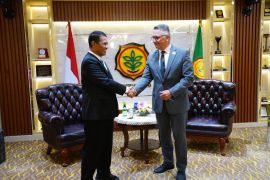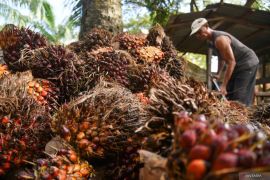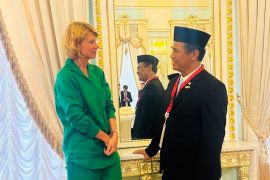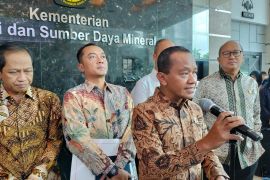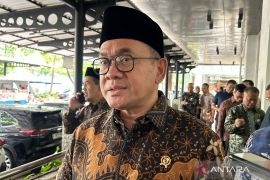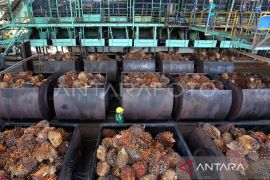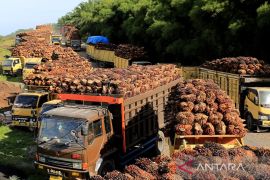But some parties in Indonesia see the boycotts as actually a bad strategy of business competitions or pressure to force Indonesia to lower its crude palm oil (CPO) prices.
Another controversy on CPO exports is currently going on following a notification issued by the US Environmental Protection Agency (EPA) on January 28, that might lead to a stop of Indonesia`s CPO exports to the US.
According to the EPA policy, palm oil can not be used as feedstock in biofuel production because its greenhouse gas saving is only 17 percent, falling short of the 20 percent minimum requirement.
The EPA has extended the deadline for public comments over its policy to March 28 from February 27 to give more time for the palm oil producers and other stakeholders of the industry to provide inputs and suggestions, before arriving to a final decision.
In response to the EPA`s ruling, the Indonesian trade ministry`s Director General of International Trade Deddy Saleh said recently that the US policy can be categorized as a discriminative measure because cooking oil made from soybean, sunflower oil, and corn oil are considered to contain greater carbon emissions than oil palm.
"Palm has less environmental impact than soybean. Further more, land productivity of oil palm could be 4 tons per hectare, while that of soybean is only at 0.4 tons per hectare," he said in a working visit to Mamuju, West Sulawesi.
Criticizing the US ruling, Rosediana Suharto of the Indonesian Palm Oil Commission (KMSI) questioned the model used by EPA to conclude that the green house gas emission saving is only 17 percent, falling short of the agency`s minimum threshold of 20 percent.
"There are also various uncertainties with regards to the parameters used in the model," Rosediana said when speaking at the International Conference on Oil Palm and the Environment (ICOPE) in Bali recently.
Law maker Aria Bima reminded the government to stand firm towards the United States in relation with the EPA`s notification on CPO.
"America has many business interests in Indonesia. It has several mining companies, and is a major exporter of commodities such as soybean, maize, and wheat to Indonesia. So, they should keep their relations with us in good shape, including in trade," Aria Bima, who is deputy chairman of the House of Representatives (DPR)`s Commission VI on trade, industry, cooperatives, and small and medium scale business, state enterprises, said in a statement recently.
"As to their claim that our CPO is an unsustainable product because its emissions exceed the standard threshold, Indonesia must respond by giving appropriate explanations," he said.
"If they ignore our explanations, we must retaliate by taking stern measures," the politician of the Indonesian Democratic Party of Struggle (PDIP), said.
The US decision to ban Indonesian CPO products looked like a "trade war" measure, he said, while regretting the US stance.
The US as a major soybean producer was only trying to find an excuse to reject Indonesia palm oil. America was worried that Indonesia`s palm oil which is cheaper, could replace its soybean, maize, and sunflower seeds as materials to make biofuel or biodiesel, Bima said.
"As a superpower, the US should ideally show exemplary behavior in the practice of fair trade in the world. The US should not think only of its own profit, while leaving other countries to their own fate," he said.
He, however, also reminded the government that it must seriously implement the principles of Indonesian Sustainable Palm Oil (ISPO) in oil palm cultivation and in the CPO production processes.
As of March 1, 2012, Indonesia is under obligation to implement ISPO principles.
The EPA notification has not led to a boycott of Indonesian crude palm oil products overseas, however, it has worried national CPO producers, Zainal Baharuddin, the agriculture ministry`s Director General for Agricultural product processing and marketing, said in Medan, North Sumatra Province, last March 3, 2012.
He could not confirm that the allegation is part of a campaign to harm Indonesia`s CPO, but he saw indications that competing businesses were behind the notification.
"If it`s a trade competition, it`s should be objective," he said.
The government is taking the EPA`s notification seriously, and is currently preparing a detailed response to be delivered to the US on March 10, 2012, Indonesian Agriculture Minister Suswono said recently.
The response is expected explain the factual conditions of crude palm oil production in Indonesia.
Indonesia produces around 23 million tons of CPO annually, has continued to increase of late. The Indonesian Palm Oil Producers Association (Gapki) predicts Indonesia`s palm oil production in 2012 will reach 25 million tons.
The total area of oil palm plantations in 2012 is expected to reach 8.2 million hectares, while exports are projected to reach 17.5 million to 18 million tons.
Trade Minister Gita Wiyawan said in early February 2012 said that the government objected to the US regulation`s stipulation on palm oil-based biodiesel because it could affect the country`s crude palm oil exports to the US and other countries.
Indonesia`s CPO exports to the US was estimated to reach less than 100,000 tons last year.
The US Ambassador to Indonesia, Scot Marciel said recently that the EPA`s notification that CPO can not be used as feed stock in the US government biodiesel production program, is not yet final as it can still be debated by the public.
Marciel was quoted by Vivanews.com that the EPA ruling can still change depending on the results of inputs from the public including CPO producers in Indonesia and Malaysia, the world`s two largest producers.
A similar explanation was also recently given by Agriculture Counselor of the US Embassy in Jakarta Dennis Voboril that told the media the US did not embargo Indonesia`s CPO exports.
"So we should like to affirm that Indonesia`s CPO exports to the US are not embargoed," he said.
President Susilo Bambang Yudhoyono also commented on the EPA`s notification that might ban Indonesian CPO from entering the country, saying that the ruling is unfair.
He urged the US government to reconsider the policy that may hamper Indonesian palm oil exports.
"Prohibiting a country from planting oil palm is really unfair. The commodity has high economic value and brings welfare to our people, a developing nation where poverty and other problems exist," he said.
However, President Yudhoyono agreed that oil palm plantations must be supervised to avoid harming the environment.
"I remind all plantation companies to avoid damaging the environment," he said on February 15, 2012. (*)
Reporter: Fardah
Editor: Kunto Wibisono
Copyright © ANTARA 2012
